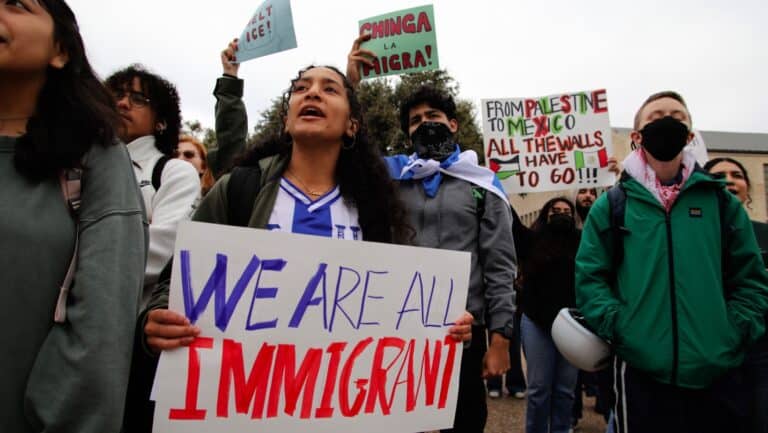What Trump’s Birthright Citizenship Plan Means for All Americans
This policy change would likely weaken the social fabric and sense of national unity, as it challenges the longstanding principle of inclusivity that has been a cornerstone of American society since the ratification of the 14th Amendment.
Based on reports from NBC News, President-elect Donald Trump has announced plans to end birthright citizenship and potentially deport American citizens born to undocumented immigrants, sparking debate over the constitutional and practical challenges of such a sweeping policy change.

Legal Challenges to Rescinding Birthright Citizenship
Rescinding birthright citizenship faces significant legal hurdles, primarily due to the 14th Amendment’s Citizenship Clause, which grants citizenship to all persons born or naturalized in the United States.
This constitutional provision is further reinforced by the Supreme Court’s 1898 ruling in United States v. Wong Kim Ark, which established that children born on U.S. soil to foreign parents are U.S. citizens.
Overturning this long-standing precedent would require either a constitutional amendment or a dramatic reinterpretation by the Supreme Court, both of which are extremely challenging processes. Legal experts argue that executive action alone would be insufficient to change this fundamental aspect of American citizenship law, setting the stage for immediate and likely successful legal challenges should such an attempt be made.
Executive Action Limitations and Implications
President-elect Trump’s proposal to use executive orders to challenge birthright citizenship faces significant limitations and potential consequences. While he suggested denying passports and Social Security numbers to children born to undocumented immigrants, such actions would likely face immediate legal challenges and could be struck down by the courts for conflicting with established constitutional and judicial precedents.
The implementation of these measures could lead to the creation of a class of stateless individuals with no claim to citizenship in either the U.S. or their parents’ countries of origin, potentially resulting in long-term social, economic, and legal limbo for these affected individuals.
Additionally, Trump’s plan to deport families with mixed immigration statuses together raises ethical and humanitarian concerns, as it could lead to the deportation of U.S. citizen children along with their undocumented parents.

Origins of the Fourteenth Amendment
The Fourteenth Amendment emerged from the tumultuous period following the American Civil War, known as the Reconstruction era. It was primarily designed to address the legal status of formerly enslaved people and ensure their civil rights. The amendment was passed by the Senate on June 8, 1866, and ratified two years later on July 9, 1868.
Key aspects of the amendment’s origins include:
- It was heavily influenced by the Civil Rights Act of 1866, which had been vetoed by President Andrew Johnson but later passed by Congress over his veto
- The amendment was drafted by Representative John Bingham, who sought to constitutionalize the protections outlined in the Civil Rights Act.
- It was one of three Reconstruction Amendments, alongside the Thirteenth and Fifteenth Amendments, aimed at securing rights for African Americans.
- The amendment’s ratification was made a condition for former Confederate states to regain federal representation, highlighting the political tensions of the time.
The Fourteenth Amendment’s creation was a direct response to the need for constitutional protection of civil liberties in the wake of slavery’s abolition, fundamentally reshaping American citizenship and civil rights law.
The principle of jus soli, or “right of the soil,” was established in English law by Calvin’s Case in 1608, which held that a person’s status was determined by their place of birth.
Historical Context of Birthright Citizenship
The concept of birthright citizenship in the United States has deep historical roots, tracing back to English common law and evolving through significant legal milestones. The principle of jus soli, or “right of the soil,” was established in English law by Calvin’s Case in 1608, which held that a person’s status was determined by their place of birth.
This principle was adopted in the antebellum United States, with some exceptions for children of ambassadors and enemy occupiers. The Civil Rights Act of 1866 first codified birthright citizenship in U.S. law, declaring all persons born in the United States to be citizens, excluding only “Indians not taxed”. This act laid the groundwork for the Fourteenth Amendment, ratified in 1868, which constitutionally guaranteed citizenship to all persons born or naturalized in the United States.
The amendment was a direct response to the infamous Dred Scott decision of 1857, which had denied citizenship to people of African descent.
The Supreme Court’s 1898 ruling in United States v. Wong Kim Ark further cemented the principle by confirming that children born in the U.S. to immigrant parents are citizens, regardless of their parent’s immigration status.
Social and Demographic Consequences
Repealing birthright citizenship could have far-reaching social and demographic consequences. Studies suggest that rather than reducing illegal immigration, such a move could significantly increase the unauthorized population in the United States. By 2050, estimates indicate the unauthorized population could grow to between 18.2 million and 24 million, depending on the specific rules applied.
This increase would create a self-perpetuating class of individuals excluded from social membership for generations, potentially leading to long-term societal stratification. The repeal would also perpetuate disadvantage across generations, as U.S.-born children of undocumented immigrants and their descendants would face limited access to essential services like healthcare and education, as well as reduced opportunities for economic success.
The ethical dilemma extends beyond immediate family impacts. Mass deportation could disrupt entire communities and critical economic sectors.
Erosion of Social Cohesion
The repeal of birthright citizenship could significantly erode social cohesion in the United States, leading to deepened divisions within communities and increased discrimination against racialized persons and those from different socio-economic backgrounds
This policy change would likely weaken the social fabric and sense of national unity, as it challenges the longstanding principle of inclusivity that has been a cornerstone of American society since the ratification of the 14th Amendment. The potential for creating a stateless class within the country could further strain social relationships, as it may lead to increased suspicion and scrutiny of individuals based on their perceived ancestry or national origin. Such a shift could fundamentally alter the American identity as a land of opportunity and equality, potentially reshaping social dynamics for generations to come.
Ethical Dilemmas in Family Deportation Policies
The ethical implications of family deportation policies raise significant humanitarian concerns, particularly regarding the well-being of U.S. citizen children. Approximately 5.1 million U.S. citizen children live with undocumented family members, and mass deportation could lead to widespread family separations
This separation can cause severe psychological trauma, with studies showing increased rates of suicidal thoughts and substance abuse among affected children.
Additionally, deportation often results in economic hardship for mixed-status families, potentially reducing household incomes by nearly half and pushing many into poverty. The ethical dilemma extends beyond immediate family impacts. Mass deportation could disrupt entire communities and critical economic sectors. There are also concerns about the potential violation of human rights, including the rights of children to family unity and stability.
The situation is further complicated by the limited mechanisms in place to safeguard the parental rights of detained or deported individuals, which can lead to prolonged family separations and even termination of parental rights.
These ethical challenges highlight the complex interplay between immigration enforcement and fundamental human rights, raising questions about the moral implications of policies that prioritize strict enforcement over family unity and child welfare.
Psychological Effects on Deportee Children

The psychological impact of deportation on children is profound and long-lasting. Children who experience the deportation of a parent or caregiver often exhibit severe emotional and behavioral challenges, including:
- Increased rates of depression, anxiety, and post-traumatic stress disorder (PTSD)
- Behavioral changes such as aggression, withdrawal, and heightened fear
- Disrupted eating and sleeping patterns
- Difficulty concentrating in school and decreased academic performance
These effects can persist long after the deportation event, with studies showing that children continue to experience psychological trauma even years later.
The sudden separation from a parent due to deportation can lead to toxic stress, negatively impacting brain development and increasing the risk of chronic mental and physical health conditions later in life.
Additionally, children in mixed-status families often live in constant fear of potential family separation, which itself can cause ongoing psychological distress and hinder normal child development.
Economic Implications of Rescinding Birthright Citizenship
Rescinding birthright citizenship could have significant negative economic consequences for the United States. Studies show that naturalization catalyzes long-term economic integration of immigrants, with citizenship leading to increased annual earnings of approximately $5,000 over 15 years.
This economic boost is particularly pronounced for marginalized immigrants, suggesting that citizenship helps alleviate labor market discrimination. Repealing birthright citizenship would likely increase the unauthorized population substantially, potentially reaching 16-24 million by 2050.
This growth would create a self-perpetuating underclass excluded from full economic participation, hindering overall economic growth and increasing strain on social services. Additionally, it could reduce Social Security funding as fewer workers would be paying into the system.
The policy change would also place administrative burdens on American families to prove their children’s citizenship, potentially impacting access to essential services and economic opportunities.
International Context of Birthright Citizenship
Contrary to President-elect Trump’s assertion, the United States is not unique in granting birthright citizenship. Over 30 countries, including Canada and Brazil, offer similar constitutional rights.
This global context highlights the complexity of altering such a fundamental aspect of citizenship law. The proposal to end birthright citizenship in the U.S. could have international implications, potentially affecting diplomatic relations and the country’s standing on human rights issues. Additionally, the move could influence immigration patterns and policies in other nations, as changes to U.S. citizenship laws may prompt other countries to reevaluate their own policies on birthright citizenship and immigration.
Key Implications
The proposal to rescind birthright citizenship and deport American citizens born to undocumented immigrants would have far-reaching consequences that extend beyond legal and constitutional challenges.
Such a policy shift would:
- Significantly increase the unauthorized population, potentially reaching 16-24 million by 2050, creating a self-perpetuating underclass
- Cause severe psychological trauma to children, including increased rates of depression, anxiety, and PTSD
- Disrupt communities and critical economic sectors, potentially reducing household incomes and pushing families into poverty
- Create administrative burdens for American families to prove their children’s citizenship, impacting access to essential services
Ultimately, this proposed policy change would likely exacerbate the very issues it aims to address, leading to increased illegal immigration, social stratification, and long-term economic challenges, while raising serious humanitarian concerns.
You may also want to read:
- Deportation Under Trump: How Expanded Policies Created New Targets
- Trump’s Tariff Plan: Get Ready To Pay More, Earn Less and Increase The National Debt
- 10 Times Trump Left Others Holding the Bill: A Gallery of Unpaid Debts
- Trump’s Border Wall: A $15 Billion Gamble – Was It Worth It?
Join Us

Join us on this empowering journey as we explore, celebrate, and elevate “her story.” The Queen Zone is not just a platform; it’s a community where women from all walks of life can come together, share their experiences, and inspire one another. Welcome to a space where the female experience takes center stage. Sign up for our newsletter so you don’t miss a thing, Queen!







